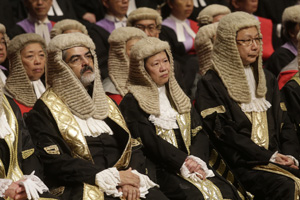Hong Kong: Change is still in the air

Tung Chee-hwa believes city is ready to move forward following a period of stagnation
On July 1 Hong Kong celebrated the 20th anniversary of its return to China, allowing us to reflect on how far we've come, where we are today and what the future may bring.
The successful implementation of "one country, two systems" has provided Hong Kong an enormous competitive advantage in moving our economic and social agenda forward. The rule of law, the free-market economy, the international character of Hong Kong, as well as our way of life, have all been preserved and bolstered. Despite having faced the severe Asian financial crisis of 1997 and 1998, the SARS attack in 2003 and then again the global financial crisis of 2008, Hong Kong's economy has grown at an average rate of 3.3 percent per year over this 20-year period. We have stayed the course, and benefited greatly from it.
According to the World Bank's Worldwide Governance Indicators issued in October last year, Hong Kong's ranking rose in many key categories in the 20-year period from 1996 to 2015. Under the category Rule of Law, Hong Kong improved from 60th to 12th. In Government Effectiveness, Hong Kong improved from 28th to third. In Control of Corruption, Hong Kong rose from 20th to 17th. Lastly, on Regulatory Quality, Hong Kong improved from fourth to second. The acknowledgment of these successes is not to defer addressing the many challenges that lie ahead.
Globalization and the rapid development of new technologies have created a growing disparity between the rich and the poor, an experience shared by many developed countries with free-market economies. This phenomenon has been further exacerbated in Hong Kong by the rapid rise in housing prices. We need to implement forward-thinking housing policies that will provide adequate and affordable housing. To do so, we also need to overcome the shortage of land supply with urgency. It is estimated that over the next 15 years, 600,000 residential units must be built, through a combination of the use of current and reclaimed land.
In a rapidly changing world, we must also better educate our next generation. The lack of upward mobility of our young people finds its roots in inadequate investment in education. Specifically, in a world where technology is developing rapidly and becoming deeply integrated into all aspects of our lives, we need to provide our youth with basic knowledge and skills in computer science, physics, mathematics and engineering, to prepare them for whatever career they wish to pursue in life.
Let us now turn our attention to the future and what lies ahead for Hong Kong. In 1997, the size of Hong Kong's economy was about 18 percent of the Chinese mainland's economy. By the end of last year, the size of Hong Kong's economy was only 3 percent of the mainland economy. China's rapid economic growth is set to continue; therefore our strategy must be to better utilize our competitive advantages under "one country, two systems" to diversify our economic base. To do this, the next generation must understand more about Chinese culture and history, particularly the last 150 years. Ultimately, as China's economy continues to grow, and as the Asian economy as a whole continues to grow, there will only be more opportunities for Hong Kong in the financial services sector, where it already rivals the largest finance hubs in the world. Specifically, as the mainland's yuan moves toward internationalization, Hong Kong has an important role to play. Hong Kong is also well-positioned, as an international financial center of high standing, to provide financing to the Belt and Road Initiative with its future enormous capital requirements.
Finance is not the only sector that will benefit from China's growth. Before 1997, Hong Kong was often referred to as the Hollywood of the East, with a film industry serving an audience of 30 to 40 million people. Since then, the Hong Kong film industry has been in hibernation. However, within one or two years, the Chinese mainland box office market, with a population of 1.4 billion people, will become the largest in the world. With the advantages of CEPA (Mainland and Hong Kong Closer Economic Partnership Arrangement), under "one country, two systems", the Hong Kong movie industry has a great opportunity for a renaissance.
Many of my friends have told me that I'm too optimistic. Some of their pessimism is a result of their view of our society. They say we are too divided, that we have too many vested interests that stand in our way, that our government bureaucracy is accustomed to a market-driven economy and cannot respond to other forms of development, and that our fragmented legislature is too difficult for the government to manage.
Although we may be divided, it is only natural for an open society to have many different opinions. However, after years of stagnation, I believe that Hong Kong wants to move forward. An overwhelming majority is in favor of "one country, two systems". Even the legislature, I believe, will understand that most people are tired of filibustering, and seriously want to see constructive and progressive policies. In my view, our energy and focus should be on Hong Kong's economic and social development under "one country, two systems". On July 1, Chief Executive Carrie Lam Cheng Yuet-ngor began leading Hong Kong forward. I know she shares the same optimism in Hong Kong's future.
The greatest source of my optimism is Hong Kong's next generation of leaders. To the young people of the special administrative region, I would like to tell you that your future is right at home. Your future is with "one country, two systems" and your commitment to Hong Kong and the nation will not only enable you to achieve your personal dreams, but also bring you the satisfaction of being part of something larger than yourself; something many of us have had the privilege of being a part of over the past 20 years.

























